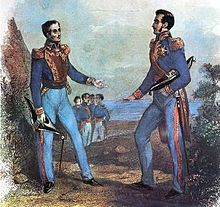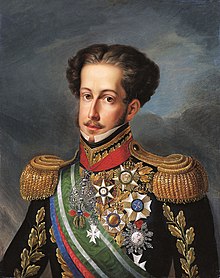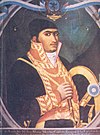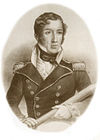Libertadores

Libertadores (Spanish pronunciation: [liβeɾtaˈðoɾes] , "Liberators") were the principal leaders of the Spanish American wars of independence from Spain and of the movement in support of Brazilian independence from Portugal. They are named that way in contrast with the Conquistadores ("Conquerors").[1]
They were largely local-born men of European descent (criollos), in most cases part of the bourgeoisie and with military training in the motherland, who were influenced by liberalism and led colonial subjects in their struggle for independence against the metropole.
List of libertadores
[edit]Hispanic America
[edit]Brazil
[edit]
Pedro I of Brazil became known as "o Libertador" ("the Liberator") in Brazil for his role in the country's independence.[15] Sporadically, the term has also been applied to other figures such as José Bonifacio (known as the "patriarch for independence"), Maria Leopoldina de Austria, and Joaquim Gonçalves Ledo.[16]
Philippines
[edit]
Emilio Aguinaldo, the first Filipino President and Generalissimo who liberated the Philippines from the Spanish Empire in 1898, is widely recognized as "El Libertador de la Patria" (The Liberator of the Homeland) [17] [18]
Legacy
[edit]The flags of Venezuela, Colombia and Ecuador follow Francisco de Miranda's design of 1806. Also, Bolivia was named after Símon Bolívar, who in turn was president of Colombia, Peru, Bolivia and twice of Venezuela. San Martín served as "President Protector" of Peru.
In what today is part of Mexico, Guatemala, El Salvador, Honduras, Nicaragua and Costa Rica, Agustín de Iturbide, a military leader revolted against the Viceroyalty of New Spain, founded an independent Mexican Empire where he ascended as Emperor Agustín I.
The names of libertadores are used all over South America to name anything from towns and places to institutions and sports clubs. Also, the most prestigious international club football competition in South America is named the Copa Libertadores in their honour.
See also
[edit]- List of national founders
- Father of the Nation
- Founding Fathers of the United States
- Statues of the Liberators
Bibliography
[edit]- Robert Harvey. Liberators: Latin America's Struggle for Independence. Woodstock, The Overlook Press, 2000. ISBN 1-58567-072-3
- James Higgins (editor). The Emancipation of Peru: British Eyewitness Accounts, 2014. Online at https://sites.google.com/site/jhemanperu
- Marion Lansing. Liberators and Heroes of South America. Boston, L. C. Page & Co., 1940.
- Irene Nicholson. The Liberators: A Study of Independence Movements in Spanish America. New York, Frederick A. Praeger, 1968.
- Pigna, Felipe (2010). Libertadores de América. Buenos Aires: Planeta. ISBN 978-950-49-2420-3.
References
[edit]- ^ Pigna, p. 9
- ^ Dunkerley, James (2000). El tercer hombre: Francisco Burdett O'Connor y la emancipación de las Américas (in Spanish). Plural editores. ISBN 978-99905-62-32-3.
- ^ Pigna, pp. 195–272
- ^ Pigna, pp. 135–192
- ^ a b Robert Harvey. Liberators: Latin America's Struggle for Independence. Woodstock, The Overlook Press, 2000. ISBN 1-58567-072-3
- ^ Pigna, p. 55-91
- ^ page 429 Robert Harvey. Liberators: Latin America's Struggle for Independence. Woodstock, The Overlook Press, 2000. ISBN 1-58567-072-3
- ^ Pigna, pp. 93–133
- ^ Lansing, pp. 15–39
- ^ Lansing, pp. 39–59
- ^ a b c Lansing, p. 121
- ^ Pigna, pp. 13–52
- ^ Lansing, pp. 119
- ^ Lansing, pp. 219
- ^ Viana, Hélio (1994). História do Brasil: período colonial, monarquia e república (in Portuguese) p.252
- ^ historia (Vénézuela), Academia nacional de la (1985). Congreso : bicentenario de Simón Bolívar: Del 17 al 24 de julio de 1983 (in Spanish). Academia Nacional de la Historia. ISBN 978-980-222-117-2.
- ^ Alip, Eufronio M. https://ejournals.ph/article.php?id=4999 (1969). The Diplomacy of the Aguinaldo Government. pp. Volume 15, No. 1-2.
{{cite book}}: External link in|first= - ^ Sytangco, AJ https://mb.com.ph/2019/03/15/aguinaldo-day-activities-set-in-cavite/ (16 May 2019). Aguinaldo Day activities set in Cavite. Manila Bulletin.
{{cite book}}: External link in|first=
External links
[edit]- (in Spanish) "Sucre, Bolívar y San Martín" Argentine Ministry of Economy
- Copa Libertadores
















